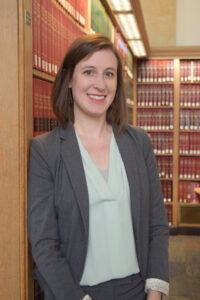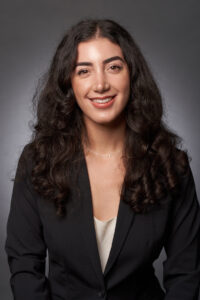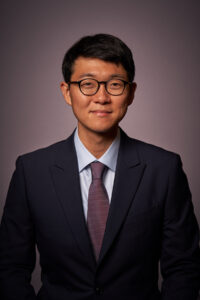This website uses cookies
We use cookies to ensure that we give you the best experience on our website. If you continue to use this site we will assume that you are happy with it.

Clinical Professor Jaclyn Kelley-Widmer, director of the 1L Immigration Law and Advocacy Clinic
“Stepping my foot in Seoul, hugging my dad, and eating my grandma’s food was a dream come true,” says “Alex,” a recent Cornell University graduate and client of Cornell Law School’s 1L Immigration Law and Advocacy Clinic. Alex, who is a Deferred Action for Childhood Arrivals (“DACA”) recipient, had reached out to Clinical Professor Jaclyn Kelley-Widmer in early 2020 hoping to find a way to visit his father and other relatives in South Korea, where he was born.
Alex—who wishes to remain anonymous—hadn’t seen his father in person in nine years. Some years after his family moved to the United States, while Alex was still a child, his father’s visa expired and he had to return to South Korea. Alex’s father promised him that he would be gone on a business trip and would see him soon, but in reality, his father wasn’t sure when he would next be able to return to the United States. As it turned out, Alex’s father had to watch his son grow up through a computer screen, consoling him after his first heartbreak and congratulating him on his Cornell acceptance and later graduation.
When Alex first reached out, the DACA program was in flux, with no travel permitted. But in the summer and fall of 2020, law students Hun Lee ’21 and Camilah Hamideh ’22 worked with Kelley-Widmer to win Alex permission to travel for a visit with his father and extended family. To make this reunion possible, the Law School team helped Alex successfully apply for Advance Parole, which was no easy undertaking—the process required patience, creative legal thinking, and most importantly, perseverance.

Camilah Hamideh ’22
Advance Parole is a permit that allows a noncitizen to return to the United States from a trip abroad without an immigrant visa. The Trump Administration prohibited DACA recipients from submitting Advance Parole applications when it rescinded DACA on September 5, 2017. As a result, Dreamers could no longer visit their sick relatives outside of the United States, study abroad, or leave the country for employment purposes.
Fast forward to June 15, 2020, when the Supreme Court found that the Trump Administration’s recission violated the Administrative Procedure Act. In response, on July 28, 2020, former Department of Homeland Security (“DHS”) Secretary Chad Wolf issued a memorandum (“the Wolf Memorandum”) that outlined the contours of the DACA policy in light of the Supreme Court’s decision. One section of the Wolf Memorandum provided Dreamers, advocates, and attorneys with a rare sliver of hope by permitting advance parole for “exceptional circumstances.”

Hun Lee ’21
The memo thus opened a door to Advance Parole that the U.S. government had shut indefinitely. After so many years, Alex had a chance to leave the United States and reunite with his father and other family members in South Korea.
Professor Kelley-Widmer enlisted the help of Lee, who is fluent in Korean, and Hamideh, who was a member of the 1L Immigration Law and Advocacy Clinic, to assist her with Alex’s case. But the clinic team faced one challenging question—what constituted an “exceptional circumstance” under the Wolf Memorandum? Because the memorandum did not provide advocates with guidelines or procedures, the clinic had to think outside of the box, scouring the internet and reaching out to advocates to gather anecdotal evidence. The clinic team even called Alex’s father to gather facts and draft an affidavit showing why Alex’s travel qualifies as an exceptional circumstance. Throughout the call, Alex’s father fought back tears as he described how much he missed his son. Deeply moved by Alex and his father’s wish to see each other again after years of separation, the clinic team put together Alex’s Advance Parole application hoping to help their wish come true.
After the team helped Alex complete his Advance Parole application, Alex embarked on a long, difficult journey to obtain approval. After spending several hours attempting to contact U.S. Citizenship and Immigration Services (USCIS) officials and several trips to his local office, a USCIS field officer ultimately denied Alex Emergency Advance Parole. Alex received this denial after he had already purchased a plane ticket to South Korea, where his family was preparing for his arrival. The clinic had applied for an Emergency Advance Parole because Alex’s family had made extensive plans to put Alex in quarantine in time to attend a very important cultural ritual to honor his late grandfather, who was unable to see his grandson prior to passing away. Despite the various setbacks and the obstacles, Alex never gave up hope.
On November 14, 2020, after months of uncertainty, the clinic received groundbreaking news—Judge Nicholas Garaufis ruled that former Secretary Wolf was not lawfully serving as Secretary of DHS when he issued the Wolf Memorandum, which meant that the administration was to restore DACA to its original form. After receiving this news, the clinic kicked into high gear, preparing and submitting a new Advance Parole application in a matter of days.
In December 2020, after four months of waiting, USCIS approved Alex’s Advance Parole application and he was able to travel to Korea. He departed the day after his application was approved and spent a month with his father, grandparents, and extended family.
While in Korea, Alex visited the grave of his grandfather, bringing closure to his grieving process. In addition, Alex’s father took him on a tour to several historic places important in Korea. They visited Gwang Hwa Moon, where they saw a statue of Lee Soon Shin, a famous general who protected Korea against the Japanese during the Imjin War. Another statue was King Sae Jong, who developed Hangul, the phonetic writing system used by Koreans to this day. They also visited many places that were still familiar to Alex even though he had not visited them since he was a small child. At one restaurant, he and his father ate Kal-guk soo, a traditional Korean noodle dish. Alex found that he remembered the restaurant and also “had the feeling that the taste of the noodle soup and dumplings actually did not change” from his childhood.
When it was time to return, the clinic team remained in close contact with Alex, advising him about how to handle Customs and Border Protection upon his return and texting him with joy when he had safely arrived. Alex reports that the trip “was a great experience to learn [his] native roots and heritage” and that his visit was “packed with memories that [he] will never forget.”